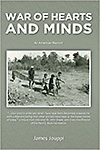Review — WAR OF HEARTS AND MINDS by James Jouppie (Thailand)
 War of Hearts And Minds: An American Memoir
War of Hearts And Minds: An American Memoir
by James Jouppi (Thailand 1971–73)
iUniverse
618 pages
$45.95 (hardcover), $35.95 (paperback), $3.95 (Kindle)
2011
Reviewed by Joanne Roll (Colombia 1963–65)
•
IN WAR FOR HEARTS AND MINDS, James Jouppi writes about his Peace Corps tour as a civil engineer assigned to the Community Development Corporation Thailand, and what happened to his life as a result. For those unfamiliar with Thailand and/or Peace Corps, Jouppi has provided maps and identifies key sites mentioned in the book. He has also created a glossary of terms. Jouppi intersperses an historic timeline of public events through out his narrative.
In the Preface, to enhance this historical context, Jouppi states:
In this memoir, I describe events which were unfolding during a War of Hearts and Minds campaign in Thailand, a War of Hearts and Minds campaign which occurred simultaneously with what, in America, is often called the Vietnam or Watergate era.
And, offers this further explanation:
This is not a fictional memoir or a product of imagination. The perceptions described herein are my honest perceptions, sometimes in real time as events occurred and sometimes later upon reflection.
Jouppi’s service also occurs during a critical transition for the Peace Corps agency.
The Nixon administration first appointment to the position of Peace Corps Director was Joseph Blatchford. Blatchford instituted a new policy called “New Directions.” Among its tenets were the requirements that most Volunteer assignments had to be in structured jobs consistent with a host country’s development needs, and that Volunteers had to possess the necessary technical skills for such positions. (For a comprehensive description of this policy see: P. David Searles, The Peace Corps Experience: Challenge & Change — 1969–1976).
In 1965, legislation was passed mandating that employees could only work for the Peace Corps agency for five years. Blatchford became the first Peace Corps Director to utilize this famous “Five Year Rule.” He fired nearly one hundred staff members, including twenty-seven country directors. The new Country Director in Thailand was former Astronaut Donn Eisele. Eisele had, evidently, no discernible experience with Thailand or economic development in the Third World or anywhere else, earth side. The mind boggles.
War For Hearts and Minds can be divided into three parts. In the first section, Jouppi describes his Peace Corps work, or at times, his lack of work. He has an engineer’s eye for detail. This recounting is historically most important because of the descriptions of the subculture of Volunteers, American airman based in Thailand, bargirls and the many faceted US aid missions in country. He gives a good account of “New Directions” as Peace Corps Volunteers attempted to work within the bureaucratic structure of Community Development Corporation Thailand. I was struck by the apparent lack of support from Peace Corps/Thailand.
Mid-tour or so, Jouppi falls in love with a Thai woman, Noy. He extends for a year, but frustrated with his inability to secure meaningful work, terminates early. Jouppi returns to the States to find a job with the intent of bringing his fiancé, Noy, to the United States.
The pivotal point in the book, and indeed his life, occurs when within a short time of being stateside, he receives a shocking letter from his PCV buddy, Winston. Winston announces that he and Noy are married. He reports that a policeman evidently raped Noy during the time that Jouppi was on home leave. She is now pregnant. The news naturally devastates Jouppi. He spends the rest of the book, and indeed, the rest of his life trying to understand how this happened and trying to eliminate the “root of bitterness” caused by the deception and betrayal.
The next 300 pages of the book describes, in agonizingly personal detail, Jouppi’s life journey as he attempts to reconcile all these events. I could sympathize with Jouppi anguish; but I found his convoluted conclusions about motivation and relationships hard to follow. Nor was I sure what the real theme was: lost love; false friendship, or Thailand, itself.
The issues are not resolved. Jouppi did finally marry a Thai woman, Phoorita, and she fittingly provides the final word as Jouppi relates on the last page of the book.
Phoorita didn’t plan on living with a man with a passion for writing about “the old days” and she’s become adept at picking out Noy’s name when perusing the author’s work.
“But she’s (Noy) part of the story!” she protests.
“When will the story be over?” long-suffering Phoorita asks.
This memoir, as do all by RPCVs, provides the perspective of serving as a Volunteer in one time and place.
•
Joanne Roll, BA/MPA, is an amateur historian researching the public records of the Peace Corps agency. She is the author of the article “Remember with Honor” (peacecorpsonline.org), the story of Colombia PCV Richard Starr who was held captive by FARC (Revolutionary Armed Forces of Colombia) for three years.
No comments yet.
Add your comment